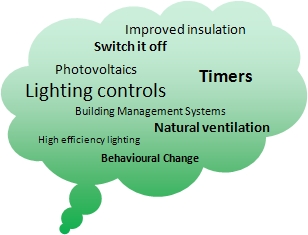Carbon Footprint Reduction
 |
For Organisations
Many businesses are taking the lead through enviromental policies and actions.
Energy Performance Programme
Practical, year-round support giving you a rapid return on investment.Saving energy and money is a priority in your business. In addition, the ability to build, promote and sustain your products and services as ‘low carbon’ to meet your supply chain demands are equally important. Our Energy Performance Programme (EPP) provides you with a fuss free and completely independent way to assess and design out carbon and cost from your products & services, delivering a rapid return on investment.
You may face pressures to reduce energy due to the Carbon Reduction Commitment Energy Efficiency Scheme (CRC EES). You may just want to save on utility bills. |
Stage 1 - Essential EPP
- Initial in depth on-site energy survey of your business facilities
- Detailed energy report and recommendations (with calculated ROI’s)
- Stakeholder review meeting to discuss the report and recommendations with your key colleagues, answer any specific questions and help you to gain support for your programme
- Four quarterly energy review telecom meetings to help you keep your programme on track, answer your questions and update you on relevant regulations
Stage 2 - Implementation EPP
Tailored implementation support, where & when you need it.- Draft an Energy Roadmap
- Feasibility study, specification for a specific technology or solution
- Market research into a specific solution
- Process reductions support
- Behavioural change reductions support
- On-site or remote support to tackle specific energy problems
Stage 3 – Reassessment EPP
Your Energy Performance Programme should
be a cyclical process. Once you have embedded the EPP into your
business we recommend a repeat energy survey to assess your performance
and help you identify further savings.
For Individuals
Here's a list of simple things you can do immediately- Turn down the central heating slightly (try just 1 to 2 degrees C). Just 1 degree will help reduce your heating bill by about 8%.
- Turn down the water heating setting (just 2 degrees will make a significant saving)
- Check the central heating timer setting - remember there is no point heating the house after you have left for work
- Fill your dish washer and washing machine with a full load - this will save you water, electricity, and washing powder
- Fill the kettle with only as much water as you need
- Do your weekly shopping in a single trip
- Hang out the washing to dry rather than tumble drying it
The following is a list of items that may take an initial investment, but should pay for themselves over the course of 1-4 years through savings on your energy bills.
- Fit energy saving light bulbs
- Install thermostatic valves on your radiators
- Insulate your hot water tank, your loft and your walls
- Installing cavity wall installation
- By installing 180mm thick loft insulation
- Recycle your grey water
- Replace your old fridge / freezer (if it is over 15 years old), with a new one with energy efficiency rating of "A"
- Replace your old boiler with a new energy efficient condensing boiler
Travel less and travel more carbon footprint friendly.
- Car share to work, or for the kids school run
- Use the bus or a train rather than your car
- For short journeys either walk or cycle
- Try to reduce the number of flights you take
- See if your employer will allow you to work from home one day a week
- Next time you replace your car - check out diesel engines. With one of these you can even make your own Biodiesel fuel. Find out more about Biodiesel.
- When staying in a hotel - turn the lights and air-conditioning off when you leave your hotel room, and ask for your room towels to be washed every other day, rather than every day
As well as your primary carbon footprint, there is also a secondary footprint that you cause through your buying habits.
- Don't buy bottled water if your tap water is safe to drink
- Buy local fruit and vegetables, or even try growing your own
- Buy foods that are in season locally
- Don't buy fresh fruit and vegetables which are out of season, they may have been flown in
- Reduce your consumption of meat
- Try to only buy products made close to home (look out and avoid items that are made in the distant lands)
- Buy organic produce
- Don't buy over packaged products
- Recycle as much as possible
- Think carefully about the type of activities you do in your spare time. Do any of these cause an increase in carbon emissions? e.g. Saunas, Health clubs, restaurants and pubs, go-karting etc. etc...
No comments:
Post a Comment